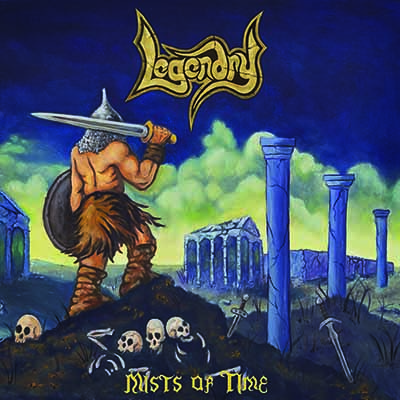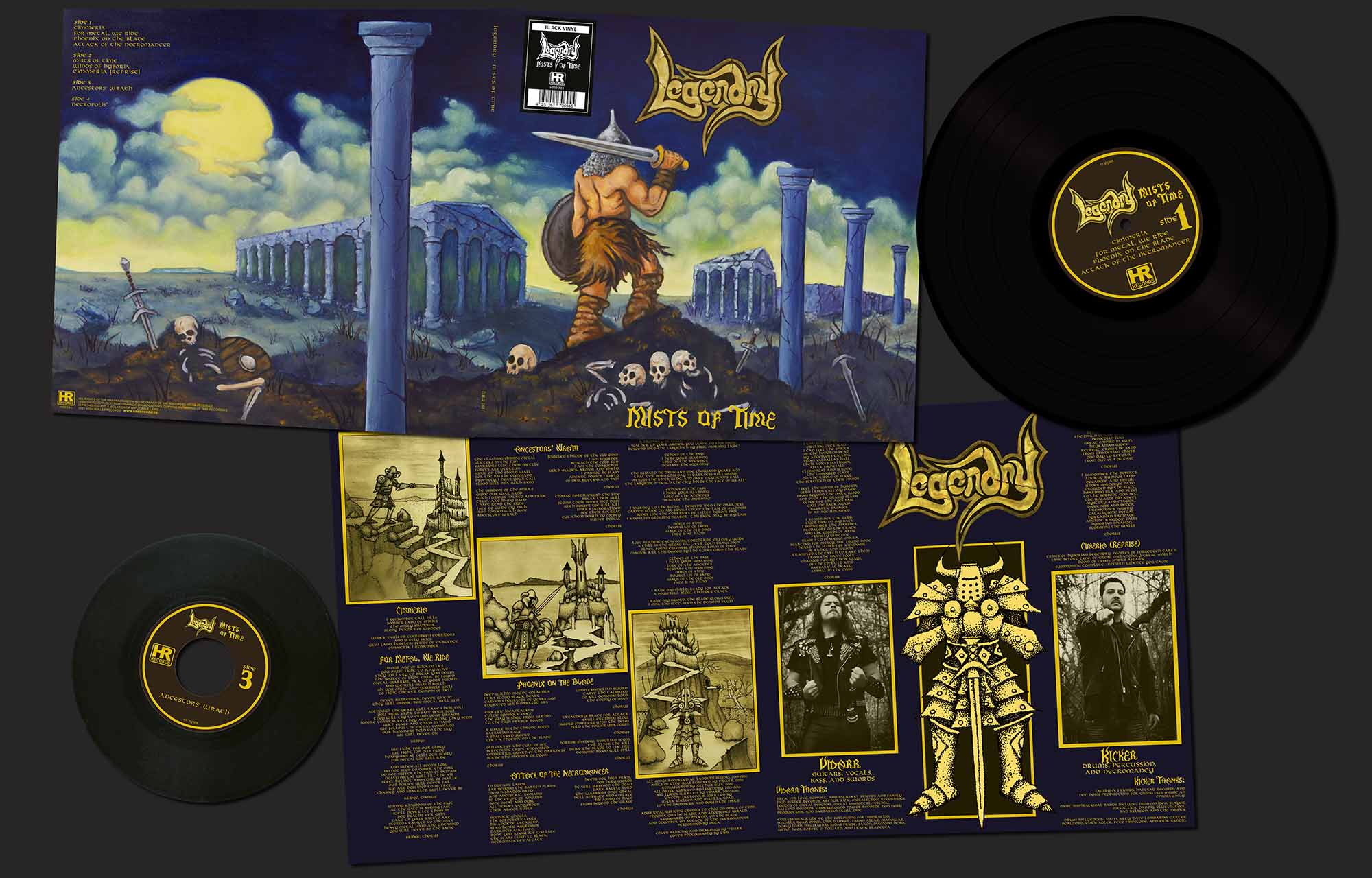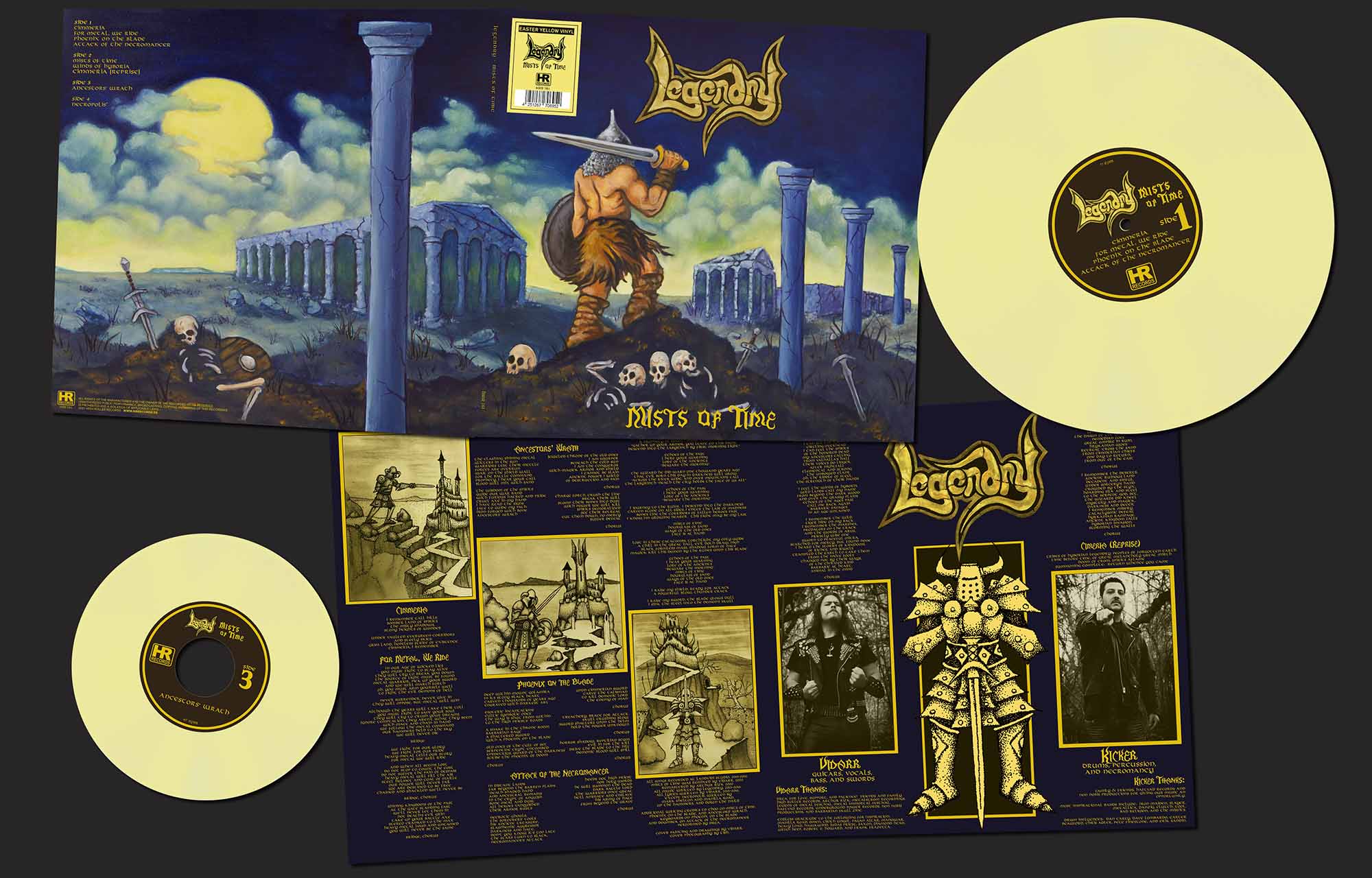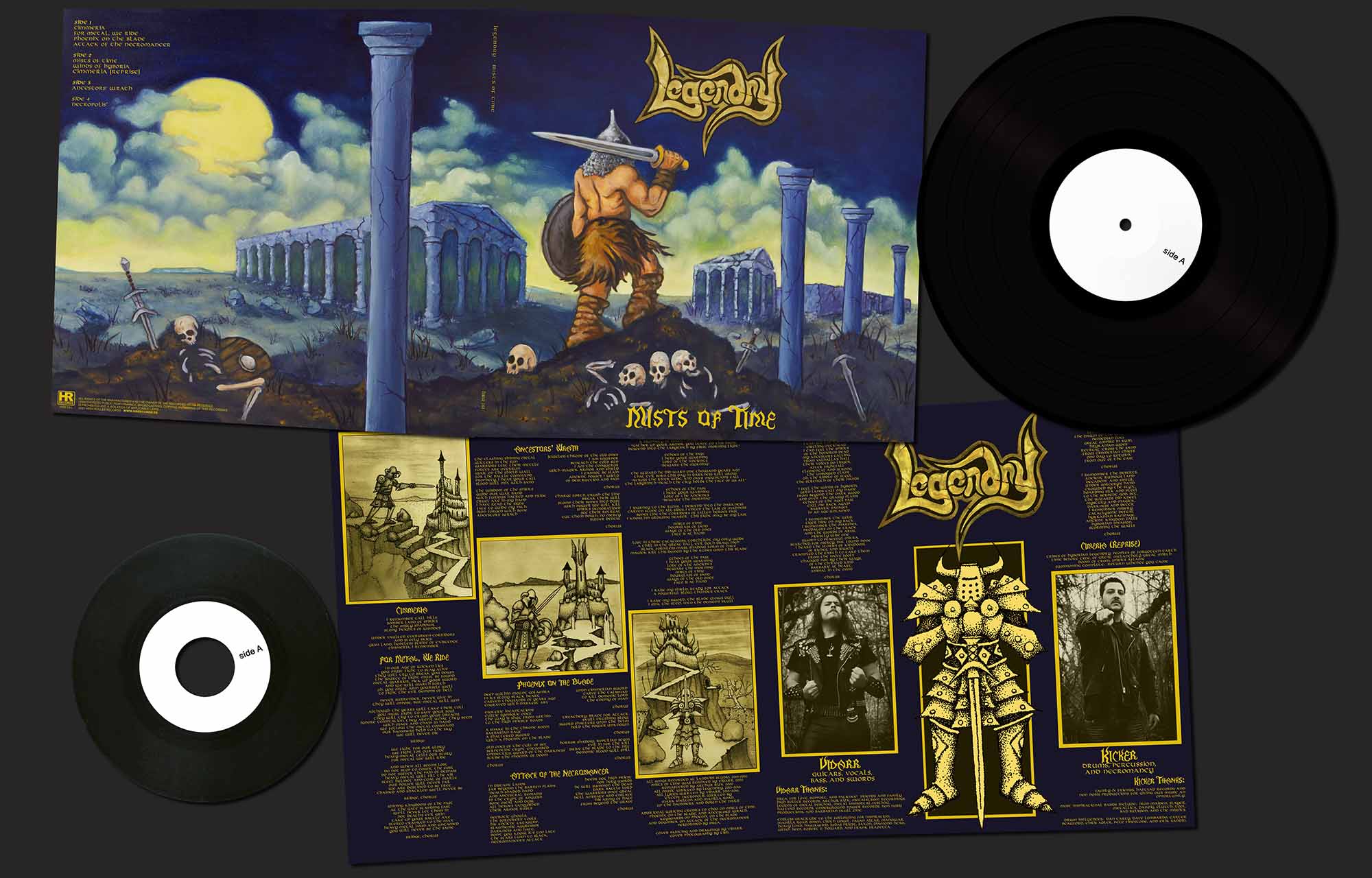 | ||||
| LEGENDRY - Mists of Time LP+7“ | |
HRR 761LP, ltd 350, 200 x black +150 easter yellow vinyl, gatefold cover | |
| Vidarr - Guitars, Vocals, Bass & Swords Kicker - Drums, Percussion, Necromancy Keyboards on Phoenix on the Blade and doumbek on Attack of the Necromancer performed by Drea. | |
| 01. Cimmeria 02. For Metal, We Ride 03. Phoenix on the Blade 04. Attack of the Necromancer 05. Mists of Time 06. Winds of Hyboria 07. Cimmeria (Reprise) 08. Ancestors’ Wrath 09. Necropolis | |
AVAILABLE | |
Formed in 2015 in Pittsburgh, Pennsylvania, Legendry are part of the new wave of Epic Metal (following in the footsteps of such grand masters as Warlord, Brocas Helm, Cirith Ungol and the mighty Manilla Road).
So far Legendry have released three studio albums: »Mists Of Time« in 2016, »Dungeon Crawler« (2017) and »The Wizard And The Tower Keep« (2019). This was followed by a new EP in 2020 aptly titled »Heavy Metal Adventure«.
Due to public demand High Roller Records is now re-releasing the band's debut platter »Mists Of Time«, originally released on CD via Non Nobis Productions in 2016.
Before »Mists Of Time«, Legendry had recorded one demo, as mastermind Vidarr (guitars, vocals, mellotron and mandolin) recalls: “We actually recorded the demo right as we were beginning to record »Mists Of Time«. For the demo, we simply placed a microphone in the middle of the room and released the best takes from those sessions. These sessions were, in some ways, intentionally on the rougher side, in that we were not too careful about our recording methods. I had to be concerned that the demo didn’t sound as good as the full length album we were to make!”
A few cuts off the »Initiation Rituals« demo also made it onto »Mists Of Time«, as Vidarr explains: “Yes, those tracks were the ones we had written first ('Ancestors’ Wrath', 'Phoenix On The Blade', and 'Mists of Time'). Following those, we filled out the rest of the album with new songs, which were written after our first bassist left the group. We had developed an odd writing style where we would record a song 'structure' of riffs, which I would then write lyrics/melodies/solos for. So, the songs technically didn’t exist until they were recorded, rather than the more traditional method of writing/rehearsing as a band that we have adopted for »The Wizard And The Tower Keep« and have kept as we move into new material.”
“I think it’s a kind of strange album,” says Vidarr looking back on the debut. “First, we went with an extended runtime of around 55 minutes, which, looking back is something which caused concern when considering the album for a vinyl release now. Overall though, I think there are definite ambitions present in those songs, and of course, an honest approach.
At that time, we weren’t thinking of reaching an audience; we simply wrote songs that we thought would be interesting and create an epic atmosphere or heroic feeling. I had an idea of creating a band that would be like a medieval version of Hawkwind. I think that in many ways, while we are adding new forms and ideas to our original work, we have carried some aspects of the style of that first album. I don’t believe we’ll ever make the same album twice, and I certainly wouldn’t want to.”
In the four years following »Mists Of Time« Legendry have definitely progressed, says Vidarr: “I would say that our arrangements have become more ambitious, and with the new material we are writing, that much is certain. Another aspect of our sound at that time was to keep things simple and meaningful, and not get overly technical. In the area of the album art, I feel I have grown as a painter, as the cover for »Mists Of Time was the first album cover I had ever painted. Now, I feel I have a better understanding of how images like that translate to print and work within a layout. Also, with our recent recording of the »Heavy Metal Adventure« EP in my home studio, I think that I have progressed a bit in terms of how to make something like that happen. While we plan to continue in professional studios for full length albums, I will continue to do quite a bit of recording work at my home studio. For example, on »The Wizard And The Tower Keep«, all lead guitars, keyboards (mellotron and Hammond sounds), violin, and the various sound effects on the album were all recorded at my home studio.
It is a constant progression though, and I never do things the exact same way twice, and try to keep everything as 'organic' and live as possible – no amp/cabinet simulations, no drum samples, no click tracks, etc. This may be to my detriment, as I know a 'better' sound can be achieved with more technology, but I want to keep things as 'real' as can be managed.”
Is it true to say that bands like Manilla Road, Brocas Helm and Cirith Ungol were the band's main sources of inspiration: “Certainly those three, but I would add Manowar to that list as well, in regards to heavy metal influences. There are, of course, countless sources of heavy metal inspiration, and outside of metal, we draw from a wide array of styles, from 70s prog and space rock, to blues, folk, punk, and even dungeon synth/ambient. Some of my latest musical obsessions are Camel, The Pentangle, Lucifer’s Friend, and later period Soft Machine. So, there is a fair amount of music I draw inspiration from outside of the typical heavy metal realms. Moving forward, I think fans will find more of these progressive elements in our new material as a mystical counterpoint to heroic epic heavy metal.”
Legendry also recorded a cover of Manilla Road's “Necropolis” for »Mists of Time«, of which Vidarr says: “I think that in many ways, it is their most accessible, and it was the one song that really grabbed me at the beginning, along with many fans of Manilla Road, to be sure. While »Crystal Logic« is generally seen as the favorite album among fans, I think where it gets a bit more interesting is everyone’s second favorite album. For example, fans who enjoy the heavier period which followed with »Open The Gates« or »The Deluge«, or the more psychedelic period which preceded it like »Metal« and »Invasion«. Personally, I tend towards the earlier albums, like »Metal« and »Dreams Of Eschaton« (or »Mark Of The Beast«). Additionally, the »After Midnight Livel« recordings are some of my favourites as well (with the standout, for me, being 'Life’s So Hard' – I just love the atmosphere of that collection of recordings). What I find that makes Manilla Road so special is the honesty.
I always feel like they are making exactly the kind of album they want to make, and they are never trying to be anything other than what they are. I never feel like they are trying to 'sell' me on an idea or aesthetic, it is always true and genuine music.
I only had the chance to see them live once, when we played a show with them alongside our friends in Lady Beast in Pittsburgh, PA. It was right before the release of »Dungeon Crawler« on Manilla Road’s 40th anniversary tour. Although we didn’t get a chance to hang out with the band other than a bit of small talk, I’ll never forget the compliments on our set from Mark Shelton and Hellroadie. Absolutely a standout memory in the short history of the band – playing our songs knowing that the band that inspired us was out in the audience listening! Our brief meetings there lead to our eventual collaboration with Neudi and Golden Core Records for the »Heavy Metal Adventure« EP, and reissue of the first two Legendry albums on CD. That meeting also lead to Phil Ross providing session bass and printing shirts for the »Heavy Metal Adventure» EP as well.”
Lyrically »Mists Of Time« does indeed follow a certain concept: “The lyrical topics on »Mists Of Time« are split between original fantasy subjects, which would eventually be crafted into the 'Earthwarrior Cycle' I am writing currently. The original fantasy topics on both »Mists Of Time« and »Dungeon Crawler« function as a kind of back story for the 'Earthwarrior' (a name he is referred to in the novelettes, but in truth, he bears no name). »The Wizard And The Tower Keep« is the culmination of those back stories, and will be continued in the next album. As for 'Cimmeria', I wrote those lyrics as a kind of response to the poem by Robert E. Howard, building and reflecting on the things in that poem I found to resonate with me. There are some who have thought this intro (and outro as well) were simply a reading, but they are a bit more than that.”
A lot of people in the scene are talking about a new wave of Epic Metal bands right now, but does Vidarr see any bands who really take their music seriously, not just jumping on the latest bandwagon? In fact he does: “I certainly have seen that there are several new Epic Metal bands, a kind of 'generation' that we are a part of, alongside Eternal Champion, Gatekeeper, Visigoth, and some others, we’re all kind of going our own epic paths. What I find so interesting about Epic Metal is the diversity of sound that can fall under the same category, as among the bands I mentioned, the sounds are all quite different. As for taking our music seriously, we absolutely do! I just read a review of some of our work where the author seemed to think that was to our detriment: that we take our music seriously. While it is fine for them to feel that way, and perhaps it may be correct, I can’t find a better thing to be serious about! That being said, we certainly have 'hidden' bits of humor in our albums all along: things which maybe only friends or the band might understand, but I don’t want to seem like we are not enjoying ourselves and having fun with the music!”
In the early 2000s, Epic Metal was highly unfashionable, t was only down to a band such as Lord Weird Sough Feg that the “genre” did not die a certain death. “For certain,” agrees Vidarr.” This was a rough time for the genre. I think that at that time with heavy metal, extreme metal was the focus. I think a return to the more old school sounds makes a great deal of sense, now that the relative 'newness' of digital recording and over production has died down in the underground (of course, more mainstream bands will still carry these sounds). I think there is at least a sizeable fan base for music which is more “earthy” or unpolished, and a sense of 'adventure'.”
It’s certainly a mystery though that Epic Metal as a genre seems to be a genuinely American affair. How can one explain that? “That certainly is a strange phenomenon,” reflects Vidarr, “ and also one could say that while created in America, it finds a stronger audience in Europe. So, a mystery indeed! I don’t like to think of bands as being more 'Epic Metal' than other bands, as it is a diverse genre. Truly, the perception of 'epic' changes from person to person. So, essentially, I think these two concepts are what makes epic metal appealing to me: that it is a concept to explore, and not simply a form to follow with specific elements which must be included.”
Matthias Mader


